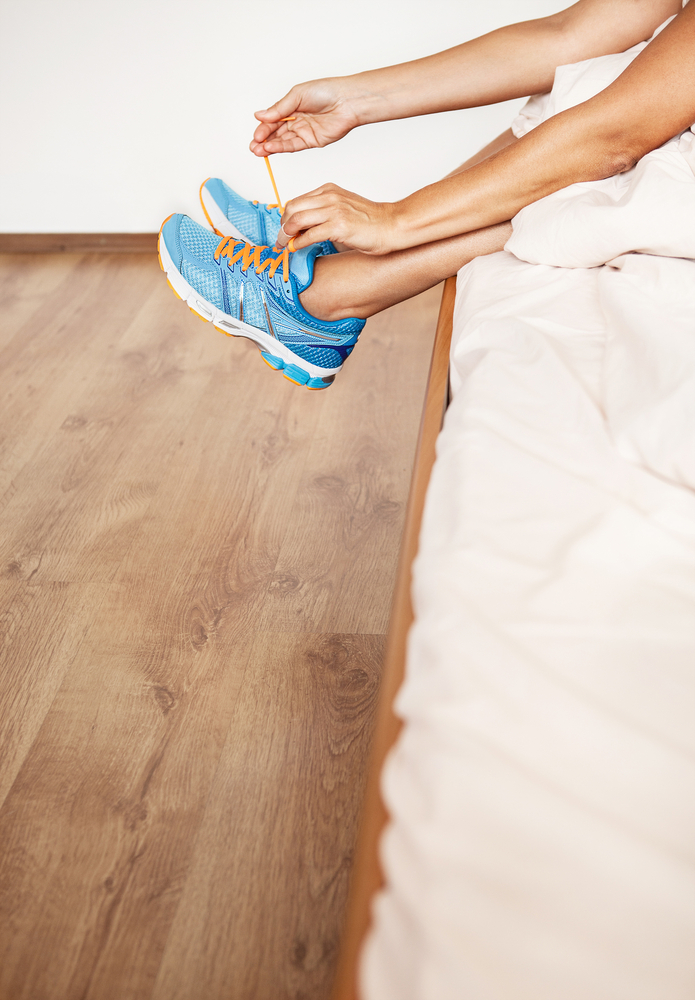We often get caught up in the big picture, total exercise and diet overhauls that we often forget that little changes can make huge impact in our lives and health goals. So instead of spending hours at the gym and going on a restrictive elimination diet, try making these six minor tweaks to see major health payoffs…
1. Dine with Class–ical Music!
A research study conducted by Cornell University, notes that if we accompany our lives to music it can have critical impact on our physical and mental health. For instance, the study monitored the eating habits of a group of fast food diners with and without music.
Researchers noted that when diners ate in setting with dim lighting and soft jazz or classical music playing in the background, they consumed food more slowly and ended up eating less. The reasoning being slower eating equated to more mindful eating and focus on hunger cues.
2. Exercise Clothes Make Good PJs
I’m assuming you like wearing comfortable clothing as you sleep. I know I do, but I also like to spring out of bed in the morning ready to workout. Getting my workout out of the way first thing in the morning assures I actually exercise despite other obligations (i.e., work, social, kids, or exhaustions).
So if exercise motivation is lacking in the morning, try sleeping in your comfiest workout attire (i.e., tank tops, sports bra, sweatpants, even yoga pants), and place your running shoes and socks right beside your bed so you’re ready and raring to go first thing before your brain can talk you out of it.
3. Get Your Vitamin D Levels Checked
2010 research from the National Institutes of Health have dubbed vitamin D deficiency “a global health epidemic”. Considering that over a billion people suffer from vitamin D deficiency or insufficiency globally, health experts are linking low vitamin D (found through a simple blood test) to all sorts of health ailments (i.e., obesity, chronic fatigue, depression, cancer, and even Alzheimer’s Disease).
Vitamin D, aka: the “sun vitamin” (roughly 90-percent is produced through sun exposure) regulates the efficiency of over 200 genes in the body associated with development and growth. NIH researchers say vitamin D deficiencies in vitamin D, particularly among women, can lead to osteoporosis, hypertension, numerous neurodegenerative diseases, depression, obesity, fibromyalgia, diabetes, chronic fatigue syndrome, and even contribute to cardiovascular disease, stroke, and breast, colon, and prostate cancers.
4. Practice Body Positivity
When is the last time you thanked your body? After all, it’s the reason why you physically got up, got dressed, made lunches for your entire family, drove to work, took the stairs (instead of the elevator), etc. That’s pretty amazing. Your body is capable.
Thanks to our unhealthy focus on celebrities, social media, and the like, we often forget how capable our bodies are and get stuck on how our bodies look, says Dr. Stacey Rosenfeld, New York-based PhD and psychologist. According to Dr. Rosenfeld, whose focus is patients with body image issues, depression, anxiety, and eating disorders, steering the focus back to body positivity can help us learn to love ourselves—despite what we not deem flaws.
5. Floss Daily
Flossing tends to be the first thing we neglect when we’re short on time in the morning or too tired before bed. However, dental experts at say flossing impacts more than just your oral health.
Sure, when plaque and bacteria accumulate in hard to reach places in between the teeth and gums, they can cause inflammation, gum disease, and cavities. However, flossing protects your health outside the mouth as well. If bad bacteria enters the bloodstream via the mouth, WebMD.com research claims it can lead to chronic diseases (i.e., pregnancy issues, hypertension and diabetes).
6. Ditch The Coffee Shop Run
I used to literally put on my sneakers every morning and run to my local cafe. However, I soon realized that this so-called “good habit” in ensuring my morning run, often had me picking up a baked good that I normally wouldn’t nosh on if I’d just brewed my own java at home.
If your route to work every morning includes a stop for coffee, Gregory J.E. Ladas, author of the book, The Couch Potato Diet, advises against it. Why? Because your daily coffee run likely surrounds you with high-sugar, high-fat, and high calorie temptations (i.e., creamy beverages and croissants) that you normally wouldn’t be eating if you just made your morning java at home.









